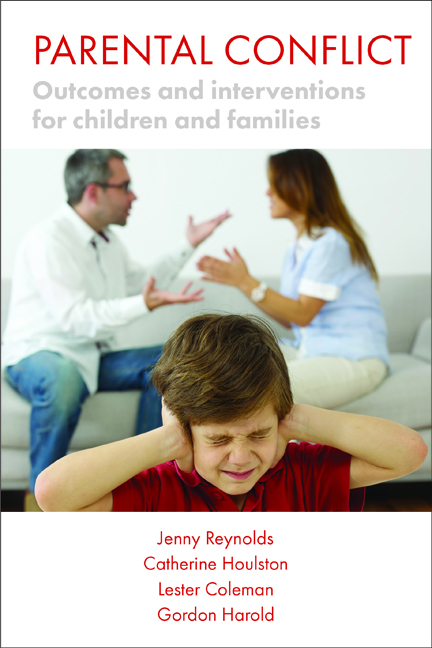Book contents
- Frontmatter
- Contents
- Foreword
- Preface
- 1 Conflict in context
- 2 Understanding different types of conflict
- 3 The impact of inter-parental conflict on children
- 4 How does inter-parental conflict affect children?
- 5 Risk and resilience: why are some children affected more than others?
- 6 Review of conflict-based interventions for couples
- 7 Implications for practice: How to help families
- 8 Conclusions and recommendations
- References
- Index
Foreword
Published online by Cambridge University Press: 04 February 2022
- Frontmatter
- Contents
- Foreword
- Preface
- 1 Conflict in context
- 2 Understanding different types of conflict
- 3 The impact of inter-parental conflict on children
- 4 How does inter-parental conflict affect children?
- 5 Risk and resilience: why are some children affected more than others?
- 6 Review of conflict-based interventions for couples
- 7 Implications for practice: How to help families
- 8 Conclusions and recommendations
- References
- Index
Summary
All happy families resemble one another, but each unhappy family is unhappy in its own way. (Anna Karenina, Leo Tolstoy, part 1, chapter 1)
When I first saw Mark, he was 8 years old and had severe abdominal pains and headaches which had been troubling him for several weeks. His GP and his parents were both concerned that there was an underlying disease process. After a number of basic investigations, it was clear to me that his parents, whom he brought with him for the appointment, were clearly not getting along well and I could sense that this was the source of his distress, as I had done with so many other families I had seen over the years. Up until recently I have felt very much unprepared to deal with such cases.
Four out of 10 marriages end in divorce now compared with around a third in 1979. The circumstances are frequently conflictual and the children often suffer and come to the attention of various adults who care for them. Practitioners like myself, need to be aware of the different forms of parental conflict and how this affects children's health and wellbeing at different ages and stages of their lives and most importantly how we can support and signpost parents to appropriate help.
This authoritative resource reviews the evidence and skilfully takes the reader though the distinctions between ‘constructive’ and ‘destructive’ forms of parental conflict, its effects on sleep, immune system, hormonal systems, and emotional health of the child and the theoretical basis on which children process such conflict in their daily lives. We read how children react in different ways depending on their gender, age, temperament and genetic make-up as well as the effects of peers and others who interface with their lives. This review looks critically at the components of what works in parenting programmes, both universal and targeted, and the additional effectiveness of those which specifically address parental conflict in their design.
Most importantly, by the end one realises oneself that, with appropriate training, there is help which we can provide to families within our spheres of influence and high quality programmes which one can signpost parents to.
- Type
- Chapter
- Information
- Parental ConflictOutcomes and Interventions for Children and Families, pp. vii - viiiPublisher: Bristol University PressPrint publication year: 2014



